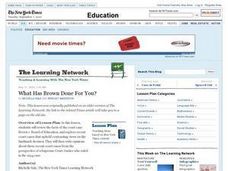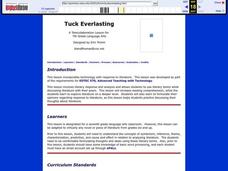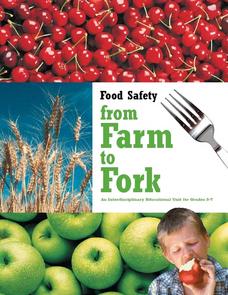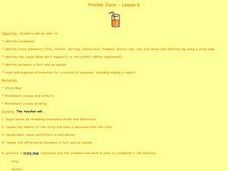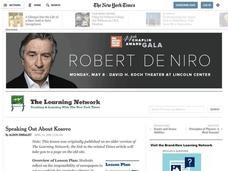Curated OER
Sounding Off About Impeachment
Help your middle and high schoolers reflect on the responsibility of newspapers to act as a vehicle for 'everyday citizens' to voice their opinions. Then, using an article about the first day of the Senate impeachment trial of President...
Curated OER
Where Do You Stand?
Scholars assess a government's ability to intervene in personal health decisions. They research basic facts about euthanasia and describe their opinions about new legislation passed in the United States Congress about an individual's...
Curated OER
What Has Brown Done for You?
Learners review the facts of the court case Brown v. Board of Education. Next, they research recent court cases that uphold contrasting views on the landmark decision. They write opinions about these recent court cases from a 1954...
Curated OER
Justice Is Blind, Colorblind That Is
It's so interesting to see kids respond to articles about education. To start the day, prompt learners to discuss the words colorblindness and diversity. Then, split your class in two and have one side read an article from 2007 and the...
Curated OER
Tuck Everlasting
Seventh graders use literary terms while discussing literature with their peers. They explore literature on a deeper level. Students formulate their opinions regarding response to literature, as this lesson helps students practice...
Curated OER
Your Right to an Attorney
An outstanding lesson plan on a person's right to have attorney's representation in a court case is here for your young learners of the law. Pupils read a lengthy account that spells out the laws regarding legal representation, then...
Harry S. Truman Library & Museum
Marshall Plan: Convince the American People
This is an excellent resource for US history classes, especially AP history. After learning some background on the Marshall Plan, the class, divided into two groups, researches opposing positions on this aid program. Groups read and...
PBS
Does Art Imitate Life?
Write what you know, sound advice for any writer and something many famous authors are known to have done. Use these materials to explore how Shakespeare's life influenced his plays. This resource is packed with readings, video segments,...
Personal Genetics Education Project
Genetics and Reproduction
Disease prevention or designer babies? Use a set of slides to introduce the growing practice of preimplantation genetic diagnosis, or PGD. Teens read related articles and then break into groups to address different scenarios. Afterward,...
Curated OER
Children's Media and Censorship
High schoolers form opinions about children and television censorship after analyzing literature. They complete a journal writing activity to identify the topic and make a list of inappropriate television shows for children. Next, they...
Curated OER
The Diary of Col. William Fairfax Gray
Fourth graders examine facts and opinions given by William Fairfax Gray in his diary, compare and contrast ideas expressed in his diary, express opinions using correct language arts skills, and calculate answers to given mathematical...
Curated OER
The Vaccination Question
Young scholars share opinions about common vaccines, then consider facts and opinions about the HPV vaccine and hold a fishbowl and discussion. They survey members of the community to determine their perspectives on the issue.
iCivics
Yeah, But...
Impress upon your young learners the importance of formulating counter arguments based on facts and not opinions. This resource is meant to strengthen arguments designed in a previous lesson, but could also be used as a stand-alone...
Curated OER
Up, Up, and Away
Middle schoolers research hot-ballooning using Internet resources including an around-the-world balloon flight. They determine fact from opinion, examine point of view, and determine main idea, and details. They write a journal entry...
Curated OER
Osage, Legend, and Arkansas History
Elementary schoolers evaluate the legend of Norristown Mountain by looking at facts about the Osage Indians and the legend itself. They do an exploration of Arkansas' Native American groups which includes a look at their legends,...
Museum of Tolerance
Developing Media Literacy
To protect young people from questionable content, many schools limit access. This resource suggests that because learners can so readily avail themselves to unrestricted Internet access, it is vital for 21st century learners to develop...
Curated OER
Collective Poetry: Teaching Tolerance
Help your class create collective poetry following a simple, engaging model from Teaching Tolerance (tolerance.org). Each young poet writes five things on an index card: sayings from others, favorite sound, favorite place, favorite...
Pennsylvania Department of Education
Stories? Information? What's the Difference?
Students listen to a power point presentation to distinguish between fiction and nonfiction text. In this what's the difference lesson, students identify fact from opinion within a text. Students listen critically and respond to text.
Curated OER
"The Story of Ruby Bridges"
Third graders examine the role of Ruby Bridges in the U.S. Civil Rights Movement. They listen to the teacher read the book "The Story of Ruby Bridges" by Robert Coles, identify what is fact or opinion in the story, and sequence events in...
Curated OER
Food Safety From Food To Fork
Students are introduced to the concept of food safety. In groups, they distinguish between fact and opinion and cause and effect while participating in a board game. They write an essay about what knowledge they gained and review the...
Curated OER
Freckle Juice- Lesson 6
Students read Freckle Juice. In this comprehension lesson, students complete a story map and discuss cause and effect based on readings from Freckle Juice.
Crafting Freedom
Thomas Day's Letter to His Daughter, Mary Ann
Why is a letter a better way to learn about a person than a different primary source? Explore Thomas Day's ideas and advice to his daughter in a letter from 1851, which details the struggles of the American South before the Civil War....
Curated OER
Speaking Out About Kosovo
Invite your class to reflect on the responsibility of newspapers to act as vehicles for citizens to voice their opinions. Using an article to gain factual info. about gov't strategies in dealing with current events in Kosovo, students...
Curated OER
Like It Or Not?
Write a review of the film adaptation of Holes. After viewing the film, your young reviewers make recommendations about viewing the film. Using details to support their opinions, they highlight the important parts of the movie without...




